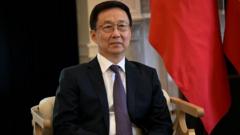Analysts suggest Han's role reflects a cautious approach by Xi Jinping towards the incoming Donald Trump administration.
China Sends Vice-President Han Zheng to Trump's Inauguration

China Sends Vice-President Han Zheng to Trump's Inauguration
Move marks a first for senior Chinese leaders and symbolizes a potential opening for US-China relations.
China has made a notable move by dispatching Vice-President Han Zheng to the inauguration of President-elect Donald Trump, marking the first time a high-ranking Chinese official has attended such an event. This development comes after Trump extended invitations to several foreign leaders, including Chinese President Xi Jinping, although it is unusual for foreign dignitaries to be present at US presidential inaugurations.
Amidst a backdrop of keen anticipation, Beijing appears ready to establish a cooperative relationship with the new US government, aiming to discover effective methods for navigating bilateral relations in what they describe as a new era. However, as uncertainties loom over possible tariffs on Chinese imports and a perceived escalation in confrontational rhetoric, the situation remains delicate. Notably, some US officials, including Secretary of State nominee Marco Rubio, have labeled China as the "largest, most advanced adversary America has ever faced."
Historically, President Xi has opted to appoint representatives rather than attending such significant ceremonies himself. For context, the Chinese ambassador to the US was present at the last two inaugurations in 2017 and 2021. Despite this tradition, Han's participation in the inauguration is indicative of broader diplomatic gestures, particularly since he was similarly present at the inauguration of Indonesia's President Prabowo Subianto three months ago.
Experts interpret Xi Jinping's decision to send his vice-president as a means to prompt Trump towards establishing a deal-making mindset. While some insiders suggested sending a figure closer to Xi, such as Cai Qi, the choice of Han is perceived as a balancing act, allowing Beijing to maintain a level of distance from any turbulence in US-China relations. Han, having served since March 2023, holds a senior position in China's governance and is not regarded as one of Xi's closest allies, making him a suitable envoy for this occasion.
His background includes significant involvement in foreign relations and leading initiatives such as the Belt and Road Initiative. As the outcome of this unprecedented diplomatic exchange remains to be seen, the world watches closely to understand the dynamics that could shape future US-China interactions.
Amidst a backdrop of keen anticipation, Beijing appears ready to establish a cooperative relationship with the new US government, aiming to discover effective methods for navigating bilateral relations in what they describe as a new era. However, as uncertainties loom over possible tariffs on Chinese imports and a perceived escalation in confrontational rhetoric, the situation remains delicate. Notably, some US officials, including Secretary of State nominee Marco Rubio, have labeled China as the "largest, most advanced adversary America has ever faced."
Historically, President Xi has opted to appoint representatives rather than attending such significant ceremonies himself. For context, the Chinese ambassador to the US was present at the last two inaugurations in 2017 and 2021. Despite this tradition, Han's participation in the inauguration is indicative of broader diplomatic gestures, particularly since he was similarly present at the inauguration of Indonesia's President Prabowo Subianto three months ago.
Experts interpret Xi Jinping's decision to send his vice-president as a means to prompt Trump towards establishing a deal-making mindset. While some insiders suggested sending a figure closer to Xi, such as Cai Qi, the choice of Han is perceived as a balancing act, allowing Beijing to maintain a level of distance from any turbulence in US-China relations. Han, having served since March 2023, holds a senior position in China's governance and is not regarded as one of Xi's closest allies, making him a suitable envoy for this occasion.
His background includes significant involvement in foreign relations and leading initiatives such as the Belt and Road Initiative. As the outcome of this unprecedented diplomatic exchange remains to be seen, the world watches closely to understand the dynamics that could shape future US-China interactions.





















